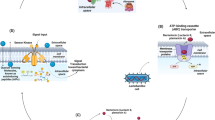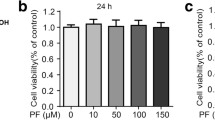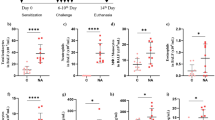Abstract
Pulmonary fibrosis (PF) is a chronic, progressive, and fibrotic interstitial lung disease with a high mortality rate. Qi-Long-Tian (QLT) capsule is an herbal formula with great potential for antifibrotic effects, consisting of San Qi (Notoginseng Radix et Rhizoma), Di Long [Pheretima aspergillum (E. Perrier)], and Hong Jingtian (Rhodiolae Crenulatae Radix et Rhizoma), and has been used in clinical practice for many years. To explore the relationship between the effects of Qi-Long-Tian capsule and gut microbiota of PF mice, pulmonary fibrosis model were established by tracheal drip injection of bleomycin. Thirty-six mice were randomly divided into 6 groups: control group (control), model group (model), QLT capsule low dose group (QL), QLT capsule medium dose group (QM), QLT capsule high dose group (QH), and pirfenidone group (PFD). After 21 days of treatment, after pulmonary function tests, the lung tissues, serums, and enterobacterial samples were collected for further analysis. HE staining and Masson’s staining were used to detect changes as the main indicators of PF in each group, and the expression of hydroxyproline (HYP) related to collagen metabolism was detected by and alkaline hydrolysis method. qRT-PCR and ELISA were used to detect the mRNA and protein expressions of pro-inflammatory factors include interleukin 1β (IL-1β), interleukin 6 (IL-6), transforming growth factor β1 (TGF-β1), tumor necrosis factor α (TNF-α) in lung tissues and serums, and the inflammation-mediating factors include tight junction protein (ZO-1, Claudin, Occludin). ELISA was used to detect the protein expressions of secretory immunoglobulin A (sIgA), short-chain fatty acids (SCFAs), and lipopolysaccharide (LPS) in colonic tissues. 16sRNA gene sequencing was used to detect changes in the abundance and diversity of intestinal flora in the control, model, and QM groups, to search for differential genera, and analyze the correlation with inflammatory factors. QLT capsule effectively improved the status of pulmonary fibrosis and reduced HYP. In addition, QLT capsule significantly reduced the abnormal levels of pro-inflammatory factors, including IL-1β, IL-6, TNF-α, and TGF-β in lung tissue and serum, while improving the levels of pro-inflammatory related factors ZO-1, Claudin, Occludin, sIgA, SCFAs, and reducing LPS in the colon. The comparison between the alpha diversity and beta diversity in enterobacteria suggested that the composition of the gut flora in the control, model, and QLT capsule groups were different. QLT capsule significantly increased the relative abundance of Bacteroidia (which might limit the onset of inflammation) and decreased the relative abundance of Clostridia (which might promote inflammation). In addition, these two enterobacteria were closely associated with pro-inflammatory-related indicators and pro-inflammatory factors in PF. All these results suggest that QLT capsule intervenes in pulmonary fibrosis by regulating the differential genera of intestinal flora, increasing immunoglobulin secretion, repairing the intestinal mucosal barrier, reducing LPS entry into the blood, and decreasing inflammatory factor secretion in the serum, which in turn alleviates pulmonary inflammation. This study clarifies the therapeutic mechanism of QLT capsule in PF and provides a theoretical basis for it. It provides a theoretical basis for its further clinical application.











Similar content being viewed by others
Data availability
The raw data supporting the conclusions of this manuscript will be made available by the authors, without undue reservation, to any qualified researcher.
Abbreviations
- cAMP:
-
Cyclic adenosine monophosphate
- Cchord:
-
Quasi-static lung compliance
- Claudin:
-
Tight junction protein
- ELISA:
-
Enzyme linked immunosorbent assay
- FEV50/FVC:
-
50 Ms first expiratory volume/forced vital capacity
- FRC:
-
Functional residual capacity
- GM:
-
Gut microflora
- HIV-1:
-
Human immunodeficiency virus 1
- HPLC:
-
High performance liquid chromatography
- HYP:
-
Hydroxyproline
- IL-1β:
-
Interleukin 1β
- IL-6:
-
Interleukin 6
- LPS:
-
Lipopolysaccharide
- MAPK:
-
Mitogen-activated protein kinase
- MMEF:
-
Mean mid-expiratory flow
- Occludin:
-
Tight junction protein
- OTU:
-
Ovarian tumor domain
- PCoA:
-
Principal coordinate analysis
- PEF:
-
Peak expiratory flow
- PF:
-
Pulmonary fibrosis
- PFD:
-
Pirfenidone
- QLT capsule:
-
Qi-Long-Tian capsule
- qRT-PCR:
-
Real-time fluorescence quantitative PCR
- SCFAs:
-
Short-chain fatty acids
- sIgA:
-
Secretory immunoglobulin A
- TGF-β1:
-
Transforming growth factor β1
- TLC:
-
Total lung capacity
- TNF-α:
-
Tumor necrosis factor α
- ZO-1:
-
Tight junction protein
References
Abdool Karim SS, Baxter C, Passmore JS et al (2019) The genital tract and rectal microbiomes: their role in HIV susceptibility and prevention in women. J Int AIDS Soc 22(5):e25300. https://doi.org/10.1002/jia2.25300
Adan RAH, van der Beek EM, Buitelaar JK et al (2019) Nutritional psychiatry: towards improving mental health by what you eat. Eur Neuropsychopharmacol 29(12):1321–1332. https://doi.org/10.1016/j.euroneuro.2019.10.011
Chen C, Xu P (2022) Activation and pharmacological regulation of inflammasomes. Biomolecules 12(7):1005–1010. https://doi.org/10.3390/biom12071005
Chen D (2018) Preliminary study on the mechanism of lung fibrosis in mice by Yilong dispersing knot formula. (Doctoral dissertation, Yunnan College of Traditional Chinese Medicine 2018: 1–15. http://cdmd.cnki.com.cn/Article/CDMD-10680-1018090629.htm. Accessed 9 Jun 2018
Chen CY (2011) TCM Database@Taiwan: the world’s largest traditional Chinese medicine database for drug screening in silico. PloS one 6(1):e15939. https://doi.org/10.1371/journal.pone.0015939
Chopra N, Halkur SS, Biswas S et al (2021) Pulmonary tuberculosis presenting as acute respiratory distress syndrome. BMJ Case Rep 14(1):e237664. https://doi.org/10.1136/bcr-2020-237664
Choudhury S, Mansi MSK et al (2021) Genome-wide identification of Ran GTPase family genes from wheat (T. aestivum) and their expression profile during developmental stages and abiotic stress conditions. Funct Integr Genomics 21(2):239–250. https://doi.org/10.1007/s10142-021-00773-0
Chunxi L, Haiyue L, Yanxia L et al (2020) The gut microbiota and respiratory diseases: new evidence. J Immunol Res 2020:2340670. https://doi.org/10.1155/2020/2340670
Dai X, Mao C, Lan X et al (2017) Acute Penicillium marneffei infection stimulates host M1/M2a macrophages polarization in BALB/C mice. BMC Microbiol 17(1):177–186. https://doi.org/10.1186/s12866-017-1086-3
Ding Q, Zhu W, Diao Y et al (2021) Elucidation of the mechanism of action of ginseng against acute lung injury/acute respiratory distress syndrome by a network pharmacology-based strategy. Front Pharmacol 11:611794. https://doi.org/10.3389/fphar.2020.611794
Fu X, Yang C, Chen B et al (2021) Qi-Long-Tian formula extract alleviates symptoms of acute high-altitude diseases via suppressing the inflammation responses in rat. Respir Res 22(1):52. https://doi.org/10.1186/s12931-021-01645-8
Furman O, Tsoory M, Chen A (2022) Differential chronic social stress models in male and female mice. Eur J Neurosci 55(9–10):2777–2793. https://doi.org/10.1111/ejn.15481
Gong GC, Song SR, Su J (2021) Pulmonary fibrosis alters gut microbiota and associated metabolites in mice: an integrated 16S and metabolomics analysis. Life Sci 264:118616. https://doi.org/10.1016/j.lfs.2020.118616
Guan Z, Goldfine H (2021) Lipid diversity in clostridia. Biochim Biophys Acta Mol Cell Biol Lipids 1866(9):158966. https://doi.org/10.1016/j.bbalip.2021.158966
Gu GG, Teng H (2008) Shennong Bencao Jing. Hunan Sci Technol Press 03:1–69
Guo CJ (2021) Immune activation kickstarts the gut microbiota. Cell Host Microbe 29(3):318–320. https://doi.org/10.1016/j.chom.2021.02.012
Guzy RD, Li L, Smith C et al (2017) Pulmonary fibrosis requires cell-autonomous mesenchymal fibroblast growth factor (FGF) signaling. J Biol Chem 292(25):10364–10378. https://doi.org/10.1074/jbc.M117.791764
Hsu YL, Hung JY, Chang WA et al (2017) Hypoxic lung cancer-secreted exosomal miR-23a increased angiogenesis and vascular permeability by targeting prolyl hydroxylase and tight junction protein ZO-1. Oncogene 36(34):4929–4942. https://doi.org/10.1038/onc.2017.105
Huang G, Khan I, Li X et al (2017) Ginsenosides Rb3 and Rd reduce polyps formation while reinstate the dysbiotic gut microbiota and the intestinal microenvironment in ApcMin/+ mice. Sci Rep 7(1):12552. https://doi.org/10.1038/s41598-017-12644-5
Huang JH, Huang XH, Chen ZY et al (2004) Dose conversion among different animals and healthy volunteers in pharmacological study. Chin J Clin Pharmacol Ther 9: 1069–1072. http://kns.cnki.net.https.gzlib.proxy.chaoxing.com/KCMS/detail/detail.aspx?dbname=cjfd2004&filename=ylzl200409025&dbcode=cjfq. Accessed 26 Oct 2004
Iacob S, Iacob DG (2019) Infectious threats, the intestinal barrier, and its trojan horse: dysbiosis. Front Microbiol 10:1676. https://doi.org/10.3389/fmicb.2019.01676
Ishaque S, Shamseer L, Bukutu C, Vohra S (2012) Rhodiola rosea for physical and mental fatigue: a systematic review. BMC Complement Altern Med 12:70. https://doi.org/10.1186/1472-6882-12-70
Jia W, Martin TA, Zhang G, Jiang WG (2013) Junctional adhesion molecules in cerebral endothelial tight junction and brain metastasis. Anticancer Res 33(6): 2353–2359. https://ar.iiarjournals.org/content/33/6/2353.long. Accessed 15 May 2013
Jia XF, Guo XB (2012) Improved rapid tracheal instillation in mice - study on oral direct vision instillation under transmission lamp. J Environ Health 29: 217–219. https://doi.org/10.16241/j.cnki.1001-5914.2012.03.022
Jówko E, Sadowski J, Długołęcka B et al (2018) Effects of Rhodiola rosea supplementation on mental performance, physical capacity, and oxidative stress biomarkers in healthy men. J Sport Health Sci 7(4):473–480. https://doi.org/10.1016/j.jshs.2016.05.005
Khan J, Noboru N, Young A, Thomas D (2017) Pro and anti-inflammatory cytokine levels (TNF-α, IL-1β, IL-6 and IL-10) in rat model of neuroma. Pathophysiology 24(3):155–159. https://doi.org/10.1016/j.pathophys.2017.04.001
Khan J, Sharma PK, Mukhopadhaya A (2015) Vibrio cholerae porin OmpU mediates M1-polarization of macrophages/monocytes via TLR1/TLR2 activation. Immunobiology 220(11):1199–1209. https://doi.org/10.1016/j.imbio.2015.06.009
Laferriere CA, Pang DS (2020) Review of intraperitoneal injection of sodium pentobarbital as a method of euthanasia in laboratory rodents. J Am Assoc Lab Anim Sci 59:254–263. https://doi.org/10.30802/AALAS-JAALAS-19-000081
Leng P, Yu XL, Wei DX et al (2016) Effect of Qilongtian on IL-1β and TNF-α in rats with influence of hypoxic pulmonary hypertension. J Beijing Univ Tradit Chin Med 39(11): 915–919. http://kns.cnki.net.https.gzlib.proxy.chaoxing.com/KCMS/detail/detail.aspx?dbname=cjfd2016&filename=jzyb201611006&dbcode=cjfq. Accessed 30 Nov 2016
Li L, Huang G, Chen T et al (2022) Fufang Fanshiliu decoction revealed the antidiabetic effect through modulating inflammatory response and gut microbiota composition. Evid Based Complement Alternat Med 2022:3255401. https://doi.org/10.1155/2022/3255401
Li N, Liu TH, Liu Y, et al. (2019) Curcumin and Curcumol Inhibit NF-κB and TGF-β1 /Smads Signaling Pathways in CSE-Treated RAW246.7 Cells. Evidence-based complementary and alternative medicine 2019:3035125. https://doi.org/10.1155/2019/3035125
Limeta A, Ji B, Levin M et al (2020) Meta-analysis of the gut microbiota in predicting response to cancer immunotherapy in metastatic melanoma. JCI Insight 5(23):e140940. https://doi.org/10.1172/jci.insight.140940
Ling Z, Jin C, Xie T et al (2016) Alterations in the fecal microbiota of patients with HIV-1 infection: an observational study in a Chinese population. Sci Rep 6:30673. https://doi.org/10.1038/srep30673
Liu XJ, Yao HY, Tu Y et al (2018) Effect of respiratory rehabilitation training combined with Kerun capsule on inflammatory response and pulmonary fibrosis in patients with silicosis complicated by COPD. J Hainan Med Coll 24(04):480–483. https://doi.org/10.13210/j.cnki.jhmu.20180203.006
Liu Y, Zhang Y, Li S, Cui J (2021) Gene expression pattern of trophoblast-specific transcription factors in trophectoderm by analysis of single-cell RNA-seq data of human blastocyst. Funct Integr Genomics 21(2):205–214. https://doi.org/10.1007/s10142-021-00770-3
Lv D, Yang HN, Liu CHC et al (2021) Responses and key gene expression of inflammatory and oxidative stress factors associated with lung fibrosis in silica-dyed mice. J Environ Occup 38(10):1150–1155. https://doi.org/10.13213/j.cnki.jeom.2021.21061
Martin TA, Jiang WG (2009) Loss of tight junction barrier function and its role in cancer metastasis. Biochim Biophys Acta 1788(4):872–891. https://doi.org/10.1016/j.bbamem.2008.11.005
Mercader-Barceló J, Truyols-Vives J, Río C et al (2020) Insights into the role of bioactive food ingredients and the microbiome in idiopathic pulmonary fibrosis. Int J Mol Sci 21(17):6051. https://doi.org/10.3390/ijms21176051
Meyer NJ, Gattinoni L, Calfee CS (2021) Acute respiratory distress syndrome. Lancet 398(10300):622–637. https://doi.org/10.1016/S0140-6736(21)00439-6
Milton PL, Dickinson H, Jenkin G et al (2012) Assessment of respiratory physiology of C57BL/6 mice following bleomycin administration using barometric plethysmography. Respiration 83:253–266. https://doi.org/10.1159/000330586
Nakerakanti S, Trojanowska M (2012) The role of TGF-β1 receptors in fibrosis. Open Rheumatol J 6:156–162. https://doi.org/10.2174/1874312901206010156
Nie H, Zheng M, Wang Z et al (2021) Transcriptomic analysis provides insights into candidate genes and molecular pathways involved in growth of Manila clam Ruditapes philippinarum. Funct Integr Genomics 21(3–4):341–353. https://doi.org/10.1007/s10142-021-00780-1
Panossian A, Wikman G, Sarris J (2010) Rosenroot (Rhodiola rosea): traditional use, chemical composition, pharmacology and clinical efficacy. Phytomedicine 17(7):481–493. https://doi.org/10.1016/j.phymed.2010.02.002
Paquin-Proulx D, Ching C, Vujkovic-Cvijin I et al (2017) Bacteroides are associated with GALT iNKT cell function and reduction of microbial translocation in HIV-1 infection. Mucosal Immunol 10(1):69–78. https://doi.org/10.1038/mi.2016.34
Pi AN (2020) Effects of Yunyao "Qilongtian" on pulmonary function and TGF-β1, MMP9 serum level in stable COPD patients. Yunnan Univ Tradit Chin Med 2020:1–9. http://kns.cnki.net.https.gzlib.proxy.chaoxing.com/KCMS/detail/detail.aspx?filename=1020086510.nh&dbname=CMFDTEMP. Accessed 1 May 2020
Pu WL, Zhang MY, Bai RY et al (2020) Anti-inflammatory effects of Rhodiola rosea L.: a review. Biomed Pharmacother 121:109552. https://doi.org/10.1016/j.biopha.2019.109552
Roberts AP, Hughes AW (1985) Complications with antibiotics used prophylactically in joint replacement surgery: a case report of cephradine-induced pseudomembranous colitis. Int Orthop 8(4):299–302. https://doi.org/10.1007/BF002668
Ru J, Li P, Wang J et al (2014) TCMSP: a database of systems pharmacology for drug discovery from herbal medicines. J Cheminform 6:13
Sato K, Yoshida K, Takumi S (2021) RNA-Seq-based DNA marker analysis of the genetics and molecular evolution of Triticeae species. Funct Integr Genomics 21(5–6):535–542. https://doi.org/10.1007/s10142-021-00799-4
Schneiderhan J, Master-Hunter T, Locke A (2016) Targeting gut flora to treat and prevent disease. J Fam Pract 65(1):34–38
Schönherr-Hellec S, Aires J (2019) Clostridia and necrotizing enterocolitis in preterm neonates. Anaerobe 58:6–12. https://doi.org/10.1016/j.anaerobe.2019.04.005
Shaw TD, McAuley DF, O’Kane CM (2019) Emerging drugs for treating the acute respiratory distress syndrome. Expert Opin Emerg Drugs 24(1):29–41. https://doi.org/10.1080/14728214.2019.1591369
Shizhen Li (2019) The compendium of materia medica. Line Book Bureau 01:150–171
Stecher B (2015) The roles of inflammation, nutrient availability and the commensal microbiota in enteric pathogen infection. Microbiol Spectr 3(3):297–320. https://doi.org/10.1128/microbiolspec.MBP-0008-2014
Totsch SK, Meir RY, Quinn TL et al (2018) Effects of a standard American diet and an anti-inflammatory diet in male and female mice. Eur J Pain 22(7):1203–1213. https://doi.org/10.1002/ejp.1207
Tucker LB, Burke JF, Fu AH, McCabe JT (2017) Neuropsychiatric symptom modeling in male and female C57BL/6J mice after experimental traumatic brain injury. J Neurotrauma 34(4):890–905. https://doi.org/10.1089/neu.2016.4508
Venturin GL, Chiku VM, Silva KL et al (2016) M1 polarization and the effect of PGE2 on TNF-α production by lymph node cells from dogs with visceral leishmaniasis. Parasite Immunol 38(11):698–704. https://doi.org/10.1111/pim.12353
Walker TB, Robergs RA (2006) Does Rhodiola rosea possess ergogenic properties? Int J Sport Nutr Exerc Metab 16(3):305–315. https://doi.org/10.1123/ijsnem.16.3.305
Wu N, Sun H, Zhao X et al (2021) MAP3K2-regulated intestinal stromal cells define a distinct stem cell niche. Nature 592(7855):606–610. https://doi.org/10.1038/s41586-021-03283-y
Wu Y, Wang T, Qiao L, Lin H (2022) Upregulated microRNA-210-3p improves sevoflurane-induced protective effect on ventricular remodeling in rats with myocardial infarction by inhibiting ADCY9. Funct Integr Genomics 22(3):279–289. https://doi.org/10.1007/s10142-021-00816-6
Wu Y, Zhang F, Yang K et al (2019) SymMap: an integrative database of traditional Chinese medicine enhanced by symptom mapping. Nucleic Acids Res 47(D1):D1110–D1117
Xia W, Khan I, Li XA et al (2020a) Adaptogenic flower buds exert cancer preventive effects by enhancing the SCFA-producers, strengthening the epithelial tight junction complex and immune responses. Pharmacol Res 159:104809. https://doi.org/10.1016/j.phrs.2020.104809
Xia W, Li X, Su L et al (2020b) Corrigendum to “lycium berry polysaccharides strengthen gut microenvironment and modulate gut microbiota of the mice.” Evid Based Complement Alternat Med 2020:4840656. https://doi.org/10.1155/2020/4840656
Yao Y, Cai X, Fei W et al (2022) The role of short-chain fatty acids in immunity, inflammation and metabolism. Crit Rev Food Sci Nutr 62(1):1–12. https://doi.org/10.1080/10408398.2020.1854675
Yu XL, Zhang XM, Zhang YX (2021) Study on action mechanism of Buqi Huoxue Tongluo formula on idiopathic pulmonary fibrosis based on bioinformations. Glob Tradit Chin Med 14(02): 209–214. http://kns.cnki.net.https.gzlib.proxy.chaoxing.com/KCMS/detail/detail.aspx?dbname=cjfd2021&filename=hqzy202102007&dbcode=cjfq. Accessed 6 Feb 2021
Zhan X, Liu B, Tong ZH (2020) Current status and considerations of pulmonary fibrosis after novel coronavirus pneumonia inflammation. Chin J Tuberc Respir 43(09):728–732. Accessed Oct 2020 http://kns.cnki.net.https.gzlib.proxy.chaoxing.com/KCMS/detail/detail.aspx?dbname=cjfd2020&filename=zhjh202009018&dbcode=cjfq
Zhang MZ, Yao B, Yang S et al (2012) CSF-1 signaling mediates recovery from acute kidney injury. J Clin Invest 122(12):4519–4532. https://doi.org/10.1172/JCI60363
Zhang Q, Luo T, Yuan DZ et al (2022) Study on the mechanism of action of Qilongtian in intervening pulmonary fibrosis in bleomycin model mice. J Shanghai Univ Tradit Chin Med 36(05):60–68. http://kns.cnki.net.https.gzlib.proxy.chaoxing.com/KCMS/detail/detail.aspx?dbname=cjfdtemp&filename=shzd202205011. Accessed 25 Oct 2022
Zhao CC, Wu XY, Yi H et al (2021a) The therapeutic effects and mechanisms of salidroside on cardiovascular and metabolic diseases: an updated review. Chem Biodivers 18(7):e2100033. https://doi.org/10.1002/cbdv.202100033
Zhao L, Cho WC, Nicolls MR (2021b) Colorectal cancer-associated microbiome patterns and signatures. Front Genet 12:787176. https://doi.org/10.3389/fgene.2021.787176
Zhao XY, Li B, Cao LY et al (2009) Opening of tight junction of human brain microvascular endothelial cells induced by small cell lung cancer cells. Adv Anat Sci 15(02):183-187,191. https://doi.org/10.16695/j.cnki.1006-2947.2009.02.027
Zhou CB, Zhou YL, Fang JY (2021) Gut microbiota in cancer immune response and immunotherapy. Trends Cancer 7(7):647–660. https://doi.org/10.1016/j.trecan.2021.01.010
Acknowledgements
This research was funded by the research on the comprehensive efficacy evaluation of “Tian Long Dao” stage-based treatment program on IPF (The key project of Yunnan Provincial Science and Technology of Chinese Medicine Association) [No. 2017FF117(-007)]. This research was supported by Yunnan Provincial Key Laboratory of Molecular Biology for Sinomedicine, China (No. 2019DG016).
Author information
Authors and Affiliations
Contributions
Q. Z. and T. L. did the conception and designed of the study. D. -Z. Y. and J. L. drafted the article and revised it critically for important intellectual content. Y. F. and J. -L. Y. approved of the version to be submitted. All authors have read and agreed to the published version of the manuscript.
Corresponding authors
Ethics declarations
Ethics approval and consent to participate
The animal study protocol was approved by the Animal Care and Welfare Committee of Yunnan University of Chinese Medicine (protocol code: R-06202023, June 15th, 2020).
Conflict of interest
The authors declare no competing interests.
Additional information
Publisher's note
Springer Nature remains neutral with regard to jurisdictional claims in published maps and institutional affiliations.
Supplementary Information
Below is the link to the electronic supplementary material.
Rights and permissions
Springer Nature or its licensor (e.g. a society or other partner) holds exclusive rights to this article under a publishing agreement with the author(s) or other rightsholder(s); author self-archiving of the accepted manuscript version of this article is solely governed by the terms of such publishing agreement and applicable law.
About this article
Cite this article
Zhang, Q., Luo, T., Yuan, D. et al. Qi-Long-Tian capsule alleviates pulmonary fibrosis development by modulating inflammatory response and gut microbiota. Funct Integr Genomics 23, 64 (2023). https://doi.org/10.1007/s10142-023-00988-3
Received:
Revised:
Accepted:
Published:
DOI: https://doi.org/10.1007/s10142-023-00988-3




